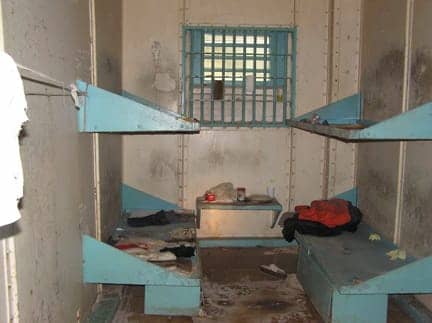by Jamilah King

The ordinance paves the way for construction of a 1,438-bed jail — less than a third of the size of the originally proposed expansion that called for more than 4,000 beds. As a point of comparison, before Hurricane Katrina the city’s jail complex had about 7,500 beds and housed prison inmates who had already been tried, convicted and sentenced.
Local and national activists have applauded the vote. In a mailing to its members, advocacy group Color of Change called the move a major victory:
“The significance of this cannot be overstated. New Orleans has been notorious for locking up a higher percentage of its adult population than any other large city in the nation. Stories abounded of men and women going to jail for offenses that routinely only merit tickets in other cities. The frequent arrests were spurred on by the jail’s funding structure, which created a perverse incentive to keep the jail as full as possible.”

“During the time the size of the new jail has been discussed, the murder rate in our city has, unfortunately, not decreased,” Orleans Parish Criminal Sheriff Marlin Gusman told the Times-Picayune.
Gusman presented the original proposal that called for more beds and issued a statement last week harshly criticizing the ordinance. In it, the sheriff said that the ordinance’s many provisions may prevent the jail from being built altogether, which at the end of the day he said would “be costly to taxpayers and prolong the use of antiquated prison facilities.”
It’s been a tough road to last week’s vote. When supporters of the smaller jail compared New Orleans with neighboring Jefferson Parish’s 1,200-inmate facility, Gusman called it “ludicrous” and naive to the city’s obvious realities.
“We are not an average city,” Gusman told the Times-Picayune last September, adding that New Orleans is urban and largely poor, while Jefferson Parish is a “bedroom community.”
For criminal justice reform advocates, that’s exactly the point. They claim that having smaller jails will force the city to explore alternatives to incarceration that tackle systemic issues like joblessness and poverty.
In that vein, nearly 50 of the city’s faith leaders are standing by the council’s vote. The Times-Picayune reported that a group of leaders from several different faiths recently released a letter they sent to the council saying that building a jail with more beds “will threaten the city’s efforts to transform our criminal justice system into a more humane, effective and efficient system that is capable of ensuring equal justice for all.”
San Francisco native Jamilah King is the news editor at Colorlines.com, where this story first appeared, coordinating story assignments and news breaks as well as covering urban politics, youth culture and Internet policy. She tweets at @jamilahking.





